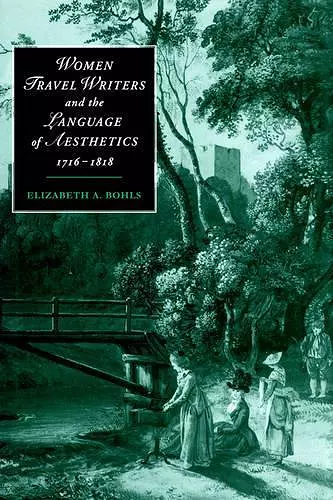Women Travel Writers and the Language of Aesthetics, 1716–1818
Format:Paperback
Publisher:Cambridge University Press
Published:10th Jun '04
Currently unavailable, and unfortunately no date known when it will be back

This study re-examines the genre of Romantic travel writing through the perspective of women writers.
Travel writing of the eighteenth and early nineteenth centuries was staple fare in an age of imperial expansion that was also the formative period of modern aesthetics. Elizabeth Bohls examines the ways in which women's travel writing of this period both drew on and challenged the conventions of aesthetic theory.British readers of the eighteenth and early nineteenth centuries eagerly consumed books of travel in an age of imperial expansion that was also the formative period of modern aesthetics. Beauty, sublimity, sensuous surfaces, and scenic views became conventions of travel writing as Britons applied familiar terms to unfamiliar places around the globe. The social logic of aesthetics, argues Elizabeth Bohls, constructed women, the labouring classes, and non-Europeans as foils against which to define the 'man of taste' as an educated, property-owning gentleman. Women writers from Mary Wortley Montagu to Mary Shelley resisted this exclusion from gentlemanly privilege, and their writings re-examine and question aesthetic conventions such as the concept of disinterested contemplation, subtly but insistently exposing its vested interests. Bohls' study expands our awareness of women's intellectual presence in Romantic literature, and suggests Romanticism's sources at the peripheries of empire rather than at its centre.
'An important and serious contribution to the field … an interesting intervention in a growing field and Bohls's consideration of women writers in particular is timely. Importantly, the argument of the book reverses the practice, prevalent in post-structuralist criticism, of isolating the aesthetic debates of the eighteenth century away from their immediate cultural context. Bohls's work, by contrast, explores the interaction between aesthetic ambitions and the practices of eighteenth century social life. In this respect Bohl's book deserves much credit.' English
ISBN: 9780521607100
Dimensions: 229mm x 153mm x 19mm
Weight: 498g
324 pages